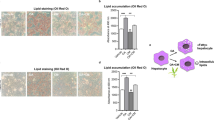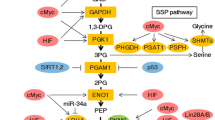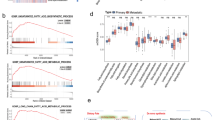Abstract
Lung cancer is a heterogeneous and complex disease with the highest incidence and mortality rate. The present study aims at defining the lung cancer phenome specificity of lipidomic profiles, screening target lipid-dependent transcriptional alternations, identifying target lipid-associated target genes, and exploring molecular mechanisms. Lung cancer-specific and lung cancer subtype-specific target lipids palmitic acid (C16:0) and stearic acid (C18:0) were found as target lipids by integrating clinical phenomics, lipidomics, and transcriptomics and exhibited antiproliferative effects in sensitive cells. The metabolism-associated gene ACSL5 or inflammation-associated gene CCL3 was identified in lung adenocarcinoma or small lung cancer cells, respectively. C16:0 or C18:0 could upregulate ACSL5 or CSF2 expression in a time- and dose-dependent pattern, and the deletion of both genes led to the insensitivity of cells. Target lipids increased the expression of PDK4 gene in different patterns and inhibited cell proliferation through alterations of intracellular energy. Thus, our data provide a new strategy to investigate the trans-points between clinical and phenomics and lipidomics and target lipid-associated molecular mechanisms to benefit from the discovery of new therapies.










Similar content being viewed by others
Abbreviations
- eQTL :
-
Expression quantitative trait locus
- GEO:
-
Gene Expression Omnibus
- LPC:
-
Lysophosphatidylcholine
- LPE:
-
Lysophosphatidylethanolamine
- PA:
-
Phosphatidic acid
- PC:
-
Phosphatidylcholine
- PE:
-
Phosphatidylethanolamine
- PG:
-
Phosphatidylglycerol
- PI:
-
Phosphatidylinositol
- PS:
-
Phosphatidylserine
References
Bligh EG, Dyer WJ. A rapid method of total lipid extraction and purification. Can J Biochem Physiol. 1959;37(8):911–7. https://doi.org/10.1139/o59-099.
Chen WC, Wang CY, Hung YH, Weng TY, Yen MC, Lai MD. Systematic analysis of gene expression alterations and clinical outcomes for long-chain acyl-coenzyme A synthetase family in cancer. PLoS One. 2016;11(5):e0155660. https://doi.org/10.1371/journal.pone.0155660.
Chen Y, Ma Z, Shen X, Li L, Zhong J, Min LS, et al. Serum lipidomics profiling to identify biomarkers for non-small cell lung cancer. Biomed Res Int. 2018;2018:5276240. https://doi.org/10.1155/2018/5276240.
Chirshev E, Oberg KC, Ioffe YJ, Unternaehrer JJ. Let-7 as biomarker, prognostic indicator, and therapy for precision medicine in cancer. Clin Transl Med. 2019;8(1):24. https://doi.org/10.1186/s40169-019-0240-y.
Ding S, Tang S, Wang M, Wu D, Guo H. Acyl-CoA synthetase 5 promotes the growth and invasion of colorectal cancer cells. Can J Gastroenterol Hepatol. 2017;2017:7615736. https://doi.org/10.1155/2017/7615736.
Doumandji Z, Safar R, Lovera-Leroux M, Nahle S, Cassidy H, Matallanas D, et al. Protein and lipid homeostasis altered in rat macrophages after exposure to metallic oxide nanoparticles. Cell Biol Toxicol. 2019:1–18. https://doi.org/10.1007/s10565-019-09484-6.
Gao D, Zhang L, Song D, Lv J, Wang L, Zhou S, et al. Values of integration between lipidomics and clinical phenomes in patients with acute lung infection, pulmonary embolism, or acute exacerbation of chronic pulmonary diseases: a preliminary study. J Transl Med. 2019;17(1):162. https://doi.org/10.1186/s12967-019-1898-z.
Gassler N, Schneider A, Kopitz J, Schnolzer M, Obermuller N, Kartenbeck J, et al. Impaired expression of acyl-CoA-synthetase 5 in epithelial tumors of the small intestine. Hum Pathol. 2003;34(10):1048–52. https://doi.org/10.1053/s0046-8177(03)00431-3.
Gassler N, Roth W, Funke B, Schneider A, Herzog F, Tischendorf JJ, et al. Regulation of enterocyte apoptosis by acyl-CoA synthetase 5 splicing. Gastroenterology. 2007;133(2):587–98. https://doi.org/10.1053/j.gastro.2007.06.005.
Han X, Gross RW. Shotgun lipidomics: multidimensional MS analysis of cellular lipidomes. Expert Rev Proteomics. 2005;2(2):253–64. https://doi.org/10.1586/14789450.2.2.253.
Han Y, Li L, Zhang Y, Yuan H, Ye L, Zhao J, et al. Phenomics of vascular disease: the systematic approach to the combination therapy. Curr Vasc Pharmacol. 2015;13(4):433–40.
Hartmann F, Sparla D, Tute E, Tamm M, Schneider U, Jeon MK, et al. Low acyl-CoA synthetase 5 expression in colorectal carcinomas is prognostic for early tumour recurrence. Pathol Res Pract. 2017;213(3):261–6. https://doi.org/10.1016/j.prp.2016.09.002.
Hong IS. Stimulatory versus suppressive effects of GM-CSF on tumor progression in multiple cancer types. Exp Mol Med. 2016;48(7):e242. https://doi.org/10.1038/emm.2016.64.
Lin L, Ding Y, Wang Y, Wang Z, Yin X, Yan G, et al. Functional lipidomics: palmitic acid impairs hepatocellular carcinoma development by modulating membrane fluidity and glucose metabolism. Hepatology. 2017;66(2):432–48. https://doi.org/10.1002/hep.29033.
Lv J, Gao D, Zhang Y, Wu D, Shen L, Wang X. Heterogeneity of lipidomic profiles among lung cancer subtypes of patients. J Cell Mol Med. 2018a;22(10):5155–9. https://doi.org/10.1111/jcmm.13782.
Lv J, Zhang L, Yan F, Wang X. Clinical lipidomics: a new way to diagnose human diseases. Clin Transl Med. 2018b;7(1):12. https://doi.org/10.1186/s40169-018-0190-9.
Mirtavoos-Mahyari H, Ghafouri-Fard S, Khosravi A, Motevaseli E, Esfahani-Monfared Z, Seifi S, et al. Circulating free DNA concentration as a marker of disease recurrence and metastatic potential in lung cancer. Clin Transl Med. 2019;8(1):14. https://doi.org/10.1186/s40169-019-0229-6.
Qi X, Yu C, Wang Y, Lin Y, Shen B. Network vulnerability-based and knowledge-guided identification of microRNA biomarkers indicating platinum resistance in high-grade serous ovarian cancer. Clin Transl Med. 2019;8(1):28. https://doi.org/10.1186/s40169-019-0245-6.
Qiao T, Wang X. A new light of proteomics in cell biology and toxicology. Cell Biol Toxicol. 2019;35(4):289–91. https://doi.org/10.1007/s10565-019-09492-6.
Qu Y, Liu D, Jia H, Zhou X. Expression analysis of ACSL5 and Wnt2B in human congenital pulmonary airway malformations. J Surg Res. 2018;232:128–36. https://doi.org/10.1016/j.jss.2018.06.023.
Reinartz A, Ehling J, Leue A, Liedtke C, Schneider U, Kopitz J, et al. Lipid-induced up-regulation of human acyl-CoA synthetase 5 promotes hepatocellular apoptosis. Biochim Biophys Acta. 2010;1801(9):1025–35. https://doi.org/10.1016/j.bbalip.2010.04.010.
Wang X. Clinical trans-omics: an integration of clinical phenomes with molecular multiomics. Cell Biol Toxicol. 2018;34(3):163–6. https://doi.org/10.1007/s10565-018-9431-3.
Wang X, Zhang Y, Nilsson CL, Berven FS, Andren PE, Carlsohn E, et al. Association of chromosome 19 to lung cancer genotypes and phenotypes. Cancer Metastasis Rev. 2015;34(2):217–26. https://doi.org/10.1007/s10555-015-9556-2.
Xu M, Wang DC, Wang X, Zhang Y. Correlation between mucin biology and tumor heterogeneity in lung cancer. Semin Cell Dev Biol. 2017;64:73–8. https://doi.org/10.1016/j.semcdb.2016.08.027.
Yan F, Zhao H, Zeng Y. Lipidomics: a promising cancer biomarker. Clin Transl Med. 2018;7(1):21. https://doi.org/10.1186/s40169-018-0199-0.
Yugi K, Kubota H, Hatano A, Kuroda S. Trans-omics: how to reconstruct biochemical networks across multiple ‘omic’ layers. Trends Biotechnol. 2016;34(4):276–90. https://doi.org/10.1016/j.tibtech.2015.12.013.
Zemski Berry KA, Murphy RC, Kosmider B, Mason RJ. Lipidomic characterization and localization of phospholipids in the human lung. J Lipid Res. 2017;58(5):926–33. https://doi.org/10.1194/jlr.M074955.
Zerin T, Kim JS, Gil HW, Song HY, Hong SY. Effects of formaldehyde on mitochondrial dysfunction and apoptosis in SK-N-SH neuroblastoma cells. Cell Biol Toxicol. 2015;31(6):261–72. https://doi.org/10.1007/s10565-015-9309-6.
Zhang L, Han X, Wang X. Is the clinical lipidomics a potential goldmine? Cell Biol Toxicol. 2018;34(6):421–3. https://doi.org/10.1007/s10565-018-9441-1.
Zhang L, Zhu B, Zeng Y, Shen H, Zhang J, Wang X. Clinical lipidomics in understanding of lung cancer: opportunity and challenge. Cancer Lett. 2020;470:75–83. https://doi.org/10.1016/j.canlet.2019.08.014.
Funding
The work was supported by operation funding of the Shanghai Institute of Clinical Bioinformatics and Shanghai Engineering and Technology Center for Artificial Intelligence of Lung and Heart Diseases from Zhongshan Hospital, The National Nature Science Foundation of China (81873409), and National Key Research and Development Program of Precision Medicine (2017YFC0909500).
Author information
Authors and Affiliations
Corresponding authors
Ethics declarations
The study was approved by Zhongshan Hospital Ethics Committee of Fudan University.
Additional information
Publisher’s note
Springer Nature remains neutral with regard to jurisdictional claims in published maps and institutional affiliations.
Rights and permissions
About this article
Cite this article
Zhang, L., Lv, J., Chen, C. et al. Roles of acyl-CoA synthetase long-chain family member 5 and colony stimulating factor 2 in inhibition of palmitic or stearic acids in lung cancer cell proliferation and metabolism. Cell Biol Toxicol 37, 15–34 (2021). https://doi.org/10.1007/s10565-020-09520-w
Received:
Accepted:
Published:
Issue Date:
DOI: https://doi.org/10.1007/s10565-020-09520-w




